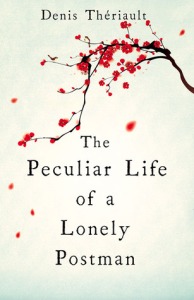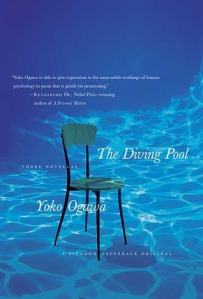Novellas in November is hosted by Laura at Reading in Bed.
 The Peculiar Life of a Lonely Postman by Denis Thériault, translated by Liedewy Hawke
The Peculiar Life of a Lonely Postman by Denis Thériault, translated by Liedewy Hawke
This book could just as easily be called The Lonely Life of a Peculiar Postman. Either way, it was the perfect escape from the election results; I curled up by the fire and read almost the whole thing in one sitting. (I don’t think I can say that I’ve ever read a whole book in one sitting – two is as good as it gets for me.)
Poor Bilodo just wants to be left alone at night to his secret hobby – steaming open other people’s letters and reading them. He doesn’t feel too bad about it since he always seals them back up and delivers them when he’s done. But there is one writer, in particular, that he is enchanted by; Ségolène. He has fallen in love with her letters to another man, all composed in Haiku.
But above all there were love letters. Because even after Valentine’s Day, love remained the most common denominator, the subject linking the greatest number of pens. Love in every grammatical form and every possible tone, dished up in every imaginable shape: passionate letters or courteous ones, sometimes suggestive and sometimes chaste, either calm or dramatic, occasionally violent, often lyrical, and especially moving when the feelings were expressed in simple terms, and never quite so touching as when the emotions hid between the lines, burning away almost invisibly behind a screen of innocuous words.
In a twist of fate, Bilodo gets a chance to protect the continuation of this correspondence and to practice his own Haiku skills. But just when he thinks things are going along nicely, his secret becomes jeopardized and life plays a cruel trick.
I tended to feel that Bilodo was both pitiful and kind of creepy (creepy but harmless). But Theriault explains in an interview at the end of the book that, in his view “Bilodo is an eminently modern character: he is isolated in his personal bubble, takes refuge in the small virtual universe, so comfortable, which he created for himself; in this twenty-first century, I believe that many of us resemble him. Bilodo fears people, and love frightens him – he prefers to live in the wonderful imaginary world that he has invented…” I guess you never know what people are doing behind closed doors. Bilodo’s “hobby” is probably pretty tame compared to some.
Swirling like water / against rugged rocks / time goes around and around
I highly recommend this Haiku-filled gem of a novella.
Winner of the Canada-Japan Literary Award (2006) I didn’t even know this award existed. Here’s a list of past winners.
Quote from Denis Theriault on writing: “… when you write, the best part is never what you had planned but what you discover on your path.”
I can tell which niijii, which friend, ran away from the school this week by the long red marks on his back. Ever a lot of red marks. Ever a lot of friends who ran away this week. But Fish Belly teacher has Fish Belly friends who go out and catch them. We have a secret path, but maybe it’s not so secret anymore. The Fish Bellies are good at catching Indian children. One day I will run. One day they won’t hurt me anymore.
Wenjack is a fictionalized story of Chanie Wenjack who, in 1964, was taken from his home at the age of 9, and sent to a residential school 600 miles away. Two years later, after attempting to run away, he came home in a casket.
We follow now, we follow always, not to lead but to capture. Someone, yes, will capture this boy’s life.
The narrative alternates between the boy and the spirits around him; following him, watching and waiting, taking the form of critters such as crows and mice, owls and fish.
This novella is short, but powerful. The brevity of the story is perfect for students or anyone else who may not want to read a longer book on the same subject. Hopefully, this story will get widely read and passed along, so that we do not forget.
From the Author’s Note:
From the 1870s until 1996, when the last school closed its doors, more than 150, 000 Indigenous children over seven generations were removed from their families in an attempted cultural genocide. Chanie, for me and for a number of others, has become a symbol not just of this tragedy but of the resilience of our First Nations, Inuit and Métis people – which is why I use the word “attempted”. Our cultures were forced underground for a long time, but they have re-emerged despite the odds. And they are thriving once more.
The Diving Pool is broken up into 3 novellas (which could arguably also be called short stories). All three carry a theme of isolation, neglect, and their psychological ramifications.
In The Diving Pool, a young teenage girl lives at an orphanage that her parents run. She is treated and lives in the same way as the other orphans, but is the only one who will never get to leave. She has strong feelings for her foster-brother, but is not able to show them or act on them. Feeling neglected and emotionally stifled, she gives into her urge to be cruel to one of the youngest children.
My desires seemed simple and terribly complicated at the same time: to gaze at Jun’s wet body and to make Rie cry. These were the only things that gave me comfort.
Aya’s “comforts” make the reader feel discomfort, her cruelty make us shake our heads in consternation. But the most uncomfortable thing about this story is the reflection of ourselves that we may be able to see in it.
He would never dive into the pool inside me, clouded as it was with the little girl’s tears. The waves of regret were gentle, but I knew they would ripple on forever.
In Pregnancy Diary, a young woman lives with her pregnant sister and brother-in-law. Already the third wheel, she feels irritated and drowned out by her sister’s extreme moods and cravings. Instead of voicing her frustrations, she starts making grapefruit jam (which made me want to make grapefruit jam), knowing that the fruit for this jam may be contaminated. She makes a pot of it for her sister to eat everyday. As Aya does in The Diving Pool, she acts out her frustrations quietly and cruelly, without remorse.
The baby haunted the shadow that fell between us.
In Dormitory, an isolated housewife, whose husband is working in another country, takes pleasure in helping a young cousin move into her old student dormitory. She begins visiting the caretaker (who is a triple amputee with one leg) regularly. The student who lived there before her cousin has gone missing, and now her cousin is said to have “gone on a trip”. She continues to visit the caretaker out of kindness, but there is a strong feeling of something sinister going on; a humming, a dripping. The ending made me think of The Nest.
I never knew how to describe it [the sound]. Still, from time to time, I attempted analogies: the icy murmur of a fountain in winter when a coin sinks to the bottom; the quaking of the fluid in the inner ear as you get off a merry-go-round; the sound of the night passing through the palm of your hand still gripping the phone after your lover hangs up… But I doubted these would help anyone understand.
Although I won’t pretend to have understood everything going on in these novellas, they were easy to fall into and be entranced by. I found them unsettling, even mildly disturbing, but wrapped up in a package of beautiful, seductive prose.
I first read about this book at 746 Books, where Cathy has written a more thorough review of it.
Have you read any novellas lately? Or anything by these authors?



How did this happen, *smacks forehead* I forgot about novellas in November!
But I read four anyway:) Nil by Mouth by Lyn C; The Burning Elephant by Christopher Raja; Twenty-four Hours in the Life of a Woman by Stefan Zweig; and Numero Zero by Umberto Eco. Here’s the link https://anzlitlovers.com/category/category/novellas-100-200-pp/
Haha! Novellas have been growing on me – I’m thinking I should read more of them. I might have to have a Novellas in January, Novellas in February,…
Off to follow your link!
Thanks for linking to my review Naomi. Glad you enjoyed The Diving Pool. I didn’t fully understand them either but I loved how open-ended the stories were.
Now I’m looking forward to reading The Housekeeper and the Professor! I’ll try not to wait until next November. 🙂
Oh, it’s my favourite of hers!
I loved Denis Thériault’s novella, although I’m glad my postman isn’t like his. Took me a little while to come to terms with that ending, though. The other two are new to me but both very tempting.
Oh, the ending! I had to wrap my head around it, but I loved it.
Even if my postman *does* read my mail, 99% of it is not very interesting. Except for the book mail… Maybe he’s getting some good reading done!
Lovely reviews. I am particularly interested in the Yoko Ogawa one. I read The House keeper and the Professor earlier this year and loved it. And I have heard her writing is very different in all her works
I still have The Housekeeper to look forward to! I’m sure it’s safe to say that if you liked that one, you will also like The Diving Pool.
I don’t think I’ve ever read a novella…unless you can call The Beautiful Bureaucrat a novella. But the first one sounds like something I might like and the last one sounds haunting….how sad for that girl living in the orphanage.
I’ve decided novellas are a lot of fun to read – they’re quick, so you can fit them in between longer books – and they’re a great way to try out new authors!
The Diving Pool *is* haunting, but also wonderful. A nice change of pace for me.
ow is it that you and Lisa and everyone else, it seems, read novellas but all of the books I get from the library are over 200 pages?
I know the rough outline of the story of Chanie Wenjack and owe it to all of the children involved in this seven-generation tragedy (and their families, and myself) to read the novella.
Reading about the Ogawa gives me the willies; I hate to imagine what actually reading them would do.
I purposefully look for books under 200 pages, or even shorter, and put a request in for them at the library. Most of the ones I choose are not available – I usually have to use the Inter Library Loan system to get them. And, even then, there are some that have never come in. But it’s fun picking them out, requesting them, and then seeing which ones come!
“the sound of the night passing through the palm of your hand” *faints with delight*
I love that, too. 🙂
Glad you found some good novellas for the month. I’m interested in all three of these! I’d heard of the first and third, but not the middle one.
The middle one is new. I recommend them all!
Goodness, these all sound a bit disturbing in different ways! Yes, I think the postman is creepy! I’m seriously hoping the author’s wrong about lots of us being like him. The stories in The Diving Pool sounds pretty unsettling too, though that makes them quite appealing…
The creepiness appeals to me, too FF. I hadn’t noticed before, though, that all three of these books are sad or disturbing in some way. I guess it makes for good reading! 🙂
Ogawa is great – those stories haunt me still! The Theriault sounds fascinating. I’m trying not to buy any books in the run-up to Christmas but I’m sorely tempted by this…
Resisting temptation is rough, isn’t it? 😉
The Boyden book sounds like the one for me. The mailman sounds both pitiful and creepy, like you said.
But it’s a good read! You can’t go wrong with any of these, but the Boyden is the most straight-forward (and the shortest). It’s also the most important.
I’m tempted by each one of these. I’ve read a different collection by Ogawa, and have wanted to read more ever since.
That’s the way I feel about Ogawa, too, now that I’ve read one. But I feel that way about a lot of authors… sigh.
All of these are good!!
Love that you reviewed some novellas. It is such a great form. It was the way I discovered one of my favorite writers, William Trevor. The novella was “Nights at the Alexandra”.
I’m going to request that one right now, Don! Then we’ll see how long it takes to get to me. 🙂
Peculiar Life sounds so good and quirky! I love the title and the cover and the idea of getting to read strangers’ mail, even if it is a bit creepy 🙂
Everything about it sounds good, doesn’t it? You could get a lot of good stories out of the premise of reading other people’s mail…
I also love the cover!
I have read 0 novellas lately, but I want to read more in the New Year! I love that Tor.com publishes their novellas — they have a fun, diverse stable of authors and lots of awesome stuff planned for 2017. So I want to read a bunch of those next year.
Oh, thanks for the tip, Jenny – I’ve not heard of them! Off to check it out…
I agree that sometimes it’s easier to accept not understanding everything about a novella-length work than a longer work; somehow, with a novella, you’re more willing to just let it settle over you, allow the atmosphere of it to sink in, rather than untie every knot in the story. I haven’t read any of these, but I want to read them all!
I hadn’t thought about it in terms of length, but that makes a lot of sense – there’s not as much time invested to feel as though you really want to figure everything out.